ADDICTION
ALCOHOL DEPENDENCE
QUIT SMOKING
ALLERGY
ANTI FUNGAL
FUNGAL INFECTION
FUNGAL NAIL INFECTIONS
ANTI-REJECTION DRUGS
ANTI WORM
ANTIBIOTIC
BACTERIAL INFECTIONS
ARTHRITIS
GOUT
OSTEOARTHRITIS
RHEUMATOID ARTHRITIS
BLOOD
LOW PLATELET COUNT
THROMBOPHLEBITIS
VARICOSE VEINS
COLON
ANAL FISSURE
PILES
ULCERATIVE COLITIS
DIABETES CARE
DIABETES INSIPIDUS
DIABETES TYPE
DIABETIC FOOT ULCERS
GLUCOSE MONITOR
EYES/EAR CARE
DRY EYES
EYE CARE
EYE EXAMINATION
EYE INFECTION
EYE LASHES
EYE PAIN
GLAUCOMA
OCULAR HYPERTENSION
UVEITIS
FEVER CARE
MALARIA
RHEUMATIC FEVER
TYPHOID FEVER
GASTROINTESTINAL
ACIDITY
CONSTIPATION
CROHN'S DISEASE
DIARRHOEA
GALLBLADDER STONES
INTESTINAL ULCERS
IRRITABLE BOWEL SYNDROME
MOTION SICKNESS
NAUSEA
Depin 10 mg (Nifedipine)
| Active Ingredient (Generic Name): | Nifedipine |
|---|---|
| Indication: | High blood pressure, Chest pain (Angina) |
| Manufacturer: | Zydus Cadila Pharma |
| Packaging: | 50 capsules in one strip, 30 capsules in one strip, 10 tablets in one strip |
| Strength: | 10 mg |
From: $61.00
Depin 10 Mg, a brand name for the generic medication nifedipine, belongs to the calcium channel blockers class. This medication relaxes blood vessels, reducing blood pressure, and is used to treat hypertension, angina, and vasospastic disorders. It works by blocking calcium ions influx into smooth muscle cells, inducing muscle relaxation and vasodilation.
Take Depin 10 Mg tablets orally once daily, following dosage instructions provided by your doctor. Common side effects include dizziness and headaches. Report severe gastrointestinal issues to your doctor.
This medication interacts with certain drugs, including cimetidine, phenytoin, and quinidine. Inform your doctor about all medications you are taking.
Pregnancy category C: animal reproduction studies have shown an adverse effect on the fetus. It is unknown whether Depin 10 Mg will harm an unborn baby. Inform your doctor if you are pregnant or plan to become pregnant.
Main Points
Depin 10 Mg is a brand name for the generic medication nifedipine, a calcium channel blocker. It relaxes blood vessels and reduces blood pressure.
This medication is used to treat hypertension, angina, and vasospastic disorders. It also manages conditions like Raynaud’s phenomenon by improving blood flow.
The typical starting dose is 10 mg taken orally once daily. Dosage instructions should be followed as provided by the doctor.
Common side effects include dizziness and headaches. Severe side effects may include rapid heartbeat, chest pain, and swelling, which require immediate medical attention.
Depin 10 Mg can interact with certain medications, such as diuretics and propranolol. It is contraindicated in pregnant or breastfeeding women and those with severe cardiovascular conditions.
What Is Depin 10 Mg?
Depin 10 Mg is a brand name for the generic medication nifedipine, which belongs to a class of drugs known as calcium channel blockers. These medications work by relaxing blood vessels, allowing them to dilate and reducing blood pressure.
As a calcium channel blocker, Depin 10 Mg inhibits the influx of calcium ions into vascular smooth muscle cells and myocardial cells, resulting in decreased contraction and relaxation of these cells. This leads to a decrease in peripheral resistance, reducing blood pressure and alleviating angina symptoms.
Depin 10 Mg is available in tablet form, with the active ingredient nifedipine present in a 10 mg strength. It is essential to take this medication exactly as directed by a doctor, as incorrect dosing can lead to adverse effects. Patients should inform their doctor about any medications they are currently taking, as Depin 10 Mg may interact with certain drugs.
Regular monitoring of blood pressure and heart rate is vital while taking Depin 10 Mg to ensure the medication is working effectively and safely.
Uses of Nifedipine Tablets
Nifedipine tablets, such as Depin 10 Mg, are prescribed to treat hypertension, angina, and certain vasospastic disorders, including Raynaud’s phenomenon. This medication reduces blood pressure and alleviates symptoms.
Nifedipine tablets are used to:
| Condition | Therapeutic Effect |
|---|---|
| Hypertension | Reduces blood pressure |
| Angina | Relaxes blood vessels, reducing frequency of attacks |
| Raynaud’s Phenomenon | Relaxes blood vessels, improving blood flow to hands and feet |
| Vasospastic Angina | Relaxes blood vessels, reducing frequency of attacks |
| Coronary Artery Spasm | Relaxes blood vessels, reducing frequency of attacks |
Depin 10 Mg is a versatile medication used to manage various cardiovascular conditions. Your doctor may prescribe it to help manage your condition and improve your quality of life.
How Depin 10 Mg Works
Depin 10 Mg’s mechanism of action involves blocking the influx of calcium ions into smooth muscle cells of blood vessels. This leads to muscle relaxation and vasodilation, reducing peripheral vascular resistance and subsequently decreasing blood pressure.
Nifedipine, the active ingredient in Depin 10 Mg, binds to voltage-dependent calcium channels in smooth muscle cells, preventing the influx of calcium ions. This results in muscle relaxation and vasodilation. As a result, blood vessels widen, improving blood flow and reducing blood pressure.
Additionally, nifedipine’s vasodilatory effects decrease the workload on the heart, reducing the amount of oxygen needed by the heart muscle. By blocking calcium channels and relaxing smooth muscle cells, Depin 10 Mg helps to improve cardiovascular health.
Dosage and Administration
To ensure safe and effective treatment with Depin 10 Mg, follow the recommended dosage guidelines. Understand the proper administration methods to maximize the medication’s effectiveness. Consider various dose adjustment factors that may impact your individualized dosage.
Dosage Guidelines
Take Depin 10 Mg tablets orally, once daily, with a full glass of water, either with or without food. Follow the dosage instructions provided by your doctor or as stated on the prescription label. The typical starting dose is 10 mg, but your doctor may adjust it based on your response to the medication. If switching from another calcium channel blocker, your doctor will guide you on the correct dosage.
Adhere to the prescribed dosage regimen to achieve effective blood pressure control. If you miss a dose, take it as soon as you remember. If it’s almost time for your next dose, skip the missed dose and continue with your regular schedule. Do not take a double dose to compensate for the missed one. If unsure about your dosage or having questions, consult your doctor or pharmacist for clarification.
Proper Administration Methods
Proper Administration Methods for Depin 10 Mg
Correct administration methods are crucial for effective management of hypertension and angina pectoris with Depin 10 Mg. To achieve optimal therapeutic benefits, follow these guidelines:
Swallow Depin 10 Mg tablets whole with a glass of water. Do not crush, chew, or divide the tablets, as this can alter the medication’s release mechanism and affect its efficacy.
Take the tablets at the same time every day, preferably during or immediately after a meal to minimize gastrointestinal side effects. Avoid taking Depin 10 Mg with grapefruit juice, as it can increase the risk of adverse reactions.
To reduce the risk of orthostatic hypotension, avoid lying down for at least 3 hours after taking Depin 10 Mg. If you forget to take a dose, take it as soon as you remember. Do not take a double dose to make up for the missed one.
Dose Adjustment Factors
Accurate dosage calculation is crucial for maximizing therapeutic benefits. To achieve this, consider the following dose adjustment factors when administering Depin 10 Mg:
Age: Elderly patients may require reduced dosages to minimize adverse effects.
Weight: Calculate the ideal dosage based on the patient’s weight to ensure optimal efficacy.
Medical History: Consider the patient’s medical history, including liver function, when adjusting the dosage. Patients with impaired liver function may require downward dosage adjustments to prevent medication accumulation.
Vital Signs: Regularly monitor the patient’s blood pressure and heart rate to adjust the dosage as needed.
Drug Interactions: Be aware of potential interactions with diuretics, beta-blockers, and ACE inhibitors, which can affect Depin 10 Mg’s efficacy and safety.
Side Effects of Nifedipine
When taking Depin 10 Mg (Nifedipine), be aware of potential side effects. Monitor yourself for common adverse reactions, which can range from mild to severe. Specifically, watch out for gastrointestinal issues and cardiovascular risks.
Common Adverse Reactions
Common Adverse Reactions
Depin 10 Mg (Nifedipine) may cause the following common adverse reactions:
- Dizziness
- Headaches
- Flushing
- Nausea
- Vomiting
- Constipation
- Swelling in the legs, ankles, or feet (fluid retention)
More serious side effects may include:
- Rapid heartbeat
- Palpitations
- Chest pain
If you experience any of these symptoms, seek medical attention immediately.
In rare cases, Nifedipine can cause allergic reactions, which can be life-threatening. Symptoms of an allergic reaction include:
- Difficulty breathing
- Swelling of the face or throat
- Hives
If you experience any of these symptoms, seek emergency medical help.
Not everyone will experience adverse reactions to Depin 10 Mg (Nifedipine). If you do, your doctor may adjust your dosage or recommend alternative treatments to minimize side effects.
Gastrointestinal Issues
Gastrointestinal issues are a common side effect of Nifedipine. During treatment with Depin 10 Mg, you may experience nausea, vomiting, or constipation. These symptoms can affect daily life. It is essential to monitor your body’s response to the medication and report any severe or persistent gastrointestinal issues to your doctor.
| Gastrointestinal Side Effect | Frequency || Nausea | 10% – 20% of patients || Vomiting | 5% – 10% of patients || Constipation | 3% – 5% of patients || Abdominal Pain | 2% – 3% of patients || Diarrhea | 1% – 2% of patients |
In some cases, lifestyle changes like a balanced diet and staying hydrated can manage gastrointestinal issues. However, if you experience severe abdominal pain, bloody stools, or vomit blood, seek immediate medical attention. Your doctor may adjust your dosage or recommend alternative medications to minimize gastrointestinal side effects. Open communication with your healthcare provider is crucial to ensure you receive the best possible care.
Cardiovascular Risks
Depin 10 Mg and Cardiovascular Risks
Taking Depin 10 Mg may increase the risk of cardiovascular problems. These risks include peripheral edema, tachycardia, and hypotension, which can be severe in some cases. Individuals with pre-existing heart conditions are particularly susceptible to these risks.
Symptoms of cardiovascular problems may include chest pain, shortness of breath, or swelling in the legs, ankles, or feet.
Nifedipine, the active ingredient in Depin 10 Mg, can cause hypotension, leading to dizziness or lightheadedness. Additionally, it may increase the risk of arrhythmias, which can be life-threatening. Individuals with a history of heart failure should exercise caution when taking Depin 10 Mg, as it can exacerbate their condition.
Regular blood pressure monitoring is crucial, as nifedipine can cause hypotension. It is essential to follow the doctor’s instructions carefully and attend regular check-ups to minimize cardiovascular risks. Promptly reporting any unusual symptoms or changes in condition to the healthcare provider is vital.
Precautions and Contraindications
Precautions and Contraindications
When taking Depin 10 Mg (Nifedipine), consider the following precautions and contraindications to ensure safe and effective treatment.
-
Pregnancy and Breastfeeding: Depin 10 Mg is contraindicated in pregnant or breastfeeding women due to potential fetal harm or effects on milk production.
-
Cardiovascular Conditions: Depin 10 Mg is contraindicated in patients with severe cardiovascular conditions, including aortic stenosis, cardiogenic shock, or unstable angina, as it may exacerbate these conditions.
-
Hypotension and Syncope: Patients with a history of hypotension or syncope should exercise caution when taking Depin 10 Mg, as it may cause a sudden drop in blood pressure.
Nifedipine Interactions With Medicines
Nifedipine interactions with medications can enhance or diminish its effects or increase the risk of adverse reactions.
Combining Nifedipine with diuretics, quinidine, or propranolol increases the risk of hypotension. Phenytoin or rifampicin can reduce Nifedipine’s efficacy. Nifedipine may increase the effects of antihypertensive medications such as beta blockers, ACE inhibitors, or diuretics.
Medications affecting the cytochrome P450 3A4 enzyme, such as itraconazole, ketoconazole, or erythromycin, can increase Nifedipine’s plasma concentration. Grapefruit juice can also enhance Nifedipine’s effects, leading to increased plasma concentrations.
Inform your doctor about all medications, including supplements and herbal products, to minimize the risk of interactions and ensure safe and effective treatment.
Overdose Symptoms and Treatment
Taking more Depin 10 Mg (Nifedipine) than prescribed can cause overdose symptoms. These symptoms include dizziness, nausea, and rapid heartbeat. Overdose can lead to serious health complications, making immediate medical attention crucial.
Depin 10 Mg overdose symptoms may include:
- Cardiovascular problems: rapid heartbeat, low blood pressure, and cardiac arrest in severe cases.
- Gastrointestinal issues: nausea, vomiting, and abdominal pain.
- Neurological problems: dizziness, headache, and seizures in rare cases.
If an overdose is suspected, call the local emergency number or the National Poison Control Center at 1-800-222-1222 (US only) for guidance. Treatment typically involves supportive care, including administering activated charcoal and monitoring vital signs. In severe cases, hospitalization may be necessary. Always follow the prescribed dosage and consult a doctor with any concerns.
Storage and Disposal Instructions
Storage and Disposal Instructions for Depin 10 Mg (Nifedipine)
Store Depin 10 Mg in its original packaging in a cool, dry place, away from direct sunlight and moisture. The ideal storage temperature is between 15?C to 30?C (59?F to 86?F). Keep the medication out of reach of children and pets.
Dispose of Depin 10 Mg responsibly. Do not flush the medication down the toilet or pour it down the drain. Participate in a drug take-back program or visit a designated collection site. If such programs are unavailable, dispose of the medication in household trash. First, remove the medication from its original packaging and mix it with an undesirable substance like coffee grounds or cat litter. Then, place the mixture in a sealed bag or container to prevent leakage.
Frequently Asked Questions
Can I Take Depin 10 Mg With Other Antihypertensives?
When treating hypertension, combining medications is possible, but it requires caution. Depin 10 mg can be taken with other antihypertensives, but a doctor’s consultation is necessary to ensure safe, effective, and personalized treatment.
Is Depin 10 Mg Safe During Pregnancy and Breastfeeding?
When taking any medication during pregnancy and breastfeeding, caution is essential. The effects on the fetus or baby are not fully understood, so consulting a doctor to discuss potential risks and benefits is necessary.
Can I Drive or Operate Heavy Machinery After Taking Depin 10 Mg?
After taking Depin 10 mg, it is not recommended to drive or operate heavy machinery due to potential side effects such as dizziness, lightheadedness, and lowered blood pressure, which can impair reaction time and judgment, increasing the risk of accidents.
What Happens if I Miss a Dose of Depin 10 Mg?
If you miss a dose of Depin 10 mg, take it as soon as you remember, unless it’s close to your next scheduled dose. In that case, skip the missed dose and resume your regular schedule to maintain consistent blood levels.
Can I Consume Alcohol While Taking Depin 10 Mg?
Consuming alcohol while taking Depin 10 Mg is not recommended. Alcohol can exacerbate dizziness and lightheadedness. Consult your doctor or pharmacist for personalized guidance on safe alcohol intake while on this medication.
Conclusion
Depin 10 mg, containing nifedipine, is prescribed to manage hypertension or angina. It works by relaxing and widening blood vessels, improving blood flow and reducing blood pressure. The recommended dosage is as directed by a doctor. Common side effects include dizziness, headache, and swelling. Inform a doctor about all medications being taken to avoid interactions. In case of overdose, seek immediate medical attention. Store Depin 10 mg in a cool, dry place, away from children and pets. Dispose of it properly when expired or no longer needed.


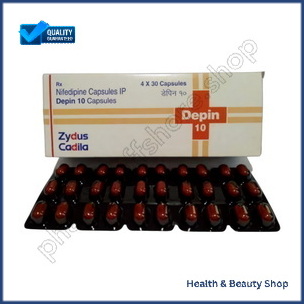
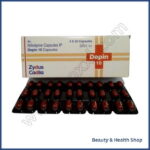
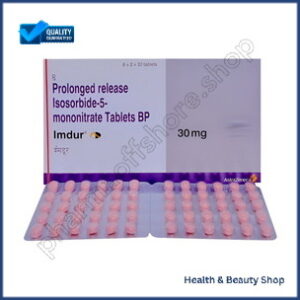
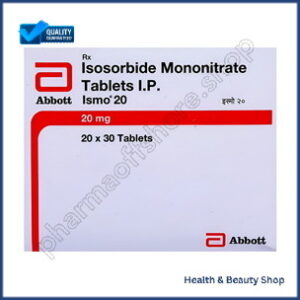
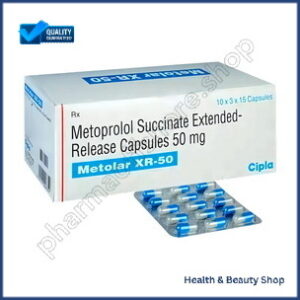
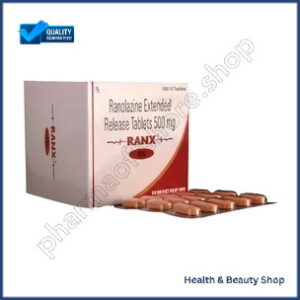
There are no reviews yet.